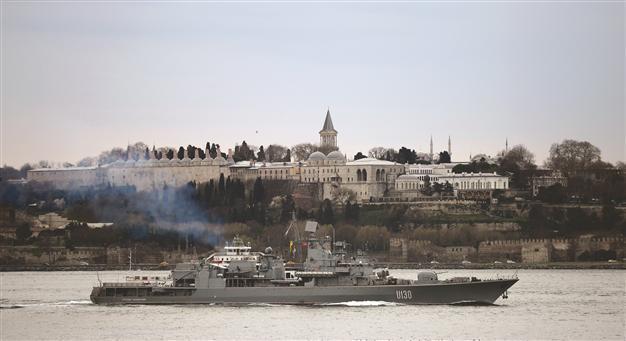Turkey under NATO and Russia pressure over Black Sea

This photo shows an Ukranian war ship passing through the Bosphorus. Turkey’s efforts to maintain the balances in the Black Sea are coming under pressure. AA photo
Although the crisis between NATO and Russia over Ukraine is not on Turkey’s immediate agenda, the likely developments have the potential to drag the Turkish government into the row. And the likely theater of such political confrontation is the Black Sea.
The sign of it was given by Russian Foreign Minister Sergei Lavrov on April 2. He expressed Russia’s concerns about the U.S. presence in the Black Sea in a way to violate the 1936 Montreux Convention that regulates the passage of military vessels of non-literal countries through the straits. “We have noticed that recently U.S. military vessels on a number of occasions have extended their presence beyond the established limits and these extensions at times failed to meet the rules of the Montreux Convention,” he said.
Due to the sensitivity of the issue, Turkey immediately denied Lavrov’s claims in a written statement, underlining that Turkey had been implementing the Montreux Convention meticulously over the last 78 years. Since the eruption of the Crimean crisis, the United States has increased its military presence in the Black Sea, sending its vessels to the Black Sea within the convention rules. A guided-missile destroyer, Truxtun, has just left the Black Sea after concluding a joint naval exercise with Romanian and Bulgarian naval forces just a few hundred kilometers away from the Crimean peninsula. There are reports that the USS Donald Cook, a guided missile destroyer, will soon be sent to the region.
The Montreux Convention is regarded as one of Turkey’s most important achievements in its recent political history and played a major role in keeping the Black Sea region out of the NATO-Warsaw Pact confrontation throughout the Cold War era. But things have changed since the collapse of the Soviet Union in the early 1990s, especially with Bulgaria and Romania’s entrance into NATO.
Along with these two countries and Turkey, there are now three NATO literal countries in the Black Sea where two other former Soviet republics, Georgia and Ukraine, have special bonds with the alliance.
The Georgian crisis in 2008 once again showed the strategic importance of the Black Sea which caused tension between Turkey and NATO over Ankara’s insistence on the strict implementation of the convention.
The same applies in the current Crimea tension, but there are claims that Turkey is much more flexible in its implementation of the key treaty. It has been claimed that allied vessels’ stay in the Black Sea is exceeding the established limit, 21 days. Some leading NATO countries are pressing Turkey to ease the implementation of the convention. Similar pressure is being applied on Turkey by Russia, which has asked the Turkish government to stick with the convention and not to ruin the decades-old balance in the Black Sea region.
Some NATO countries have noted that Russia’s seizure of the Ukrainian fleet ended Turkey’s status of having the largest fleet in the Black Sea and that there is a need for new balance in the region. That’s why they have asked Turkey to ease the implementation of some of provisions of the Montreux Convention. Russia’s aggression in the region which sparked the crisis and map changes in two literal countries in the last six years alone is also seen as an important reason why NATO has to increase its capacity and capability in the Black Sea region.
Turkey’s overall policy with regard to the Black Sea is to keep NATO out of the Black Sea and establish mechanisms to provide security through the involvement of all literal countries. The Blackseafor was established as a result of this policy in the late 1990s, but the current conditions have not allowed it to become a functional mechanism. The programs of the Blackseafor under Ukraine’s term presidency were recently canceled due to the tension between Russia and Ukraine.
The situation in which Turkey finds itself is seemingly going to become more complicated unless a political solution is found between NATO and Russia on Ukraine. Given that it is relying on NATO’s Patriots for the protection of its border from a potential Syrian missile attack, it will be hard for Turkey to stick to its traditional Black Sea policy.
